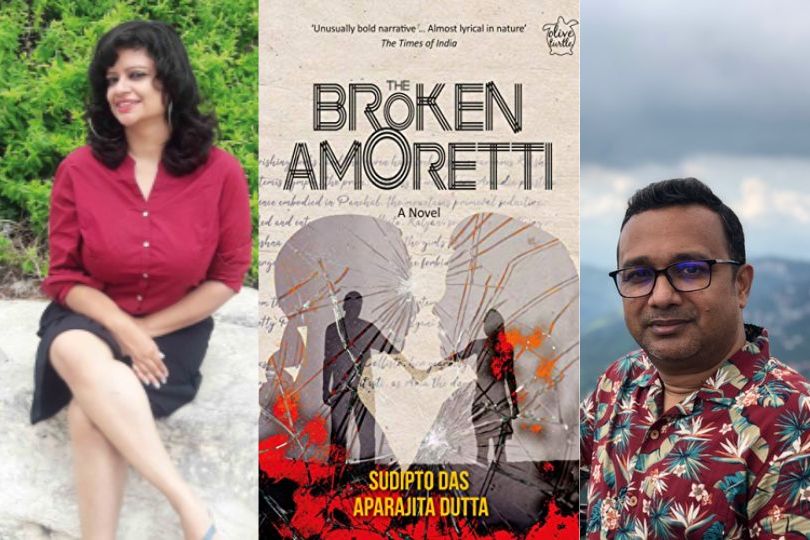Interview with Aparajita Dutta & Sudipto Das, Author of The Broken Amoretti
A lot of the lyricism and poeticism came from Aparajita – she wanted it that way! The core motivation behind our efforts was to cultivate an atmosphere of mysticism.on Jun 20, 2023

Aparajita is a writer and a social activist. An M Phil in Comparative Literature from Jadavpur University, she is currently pursuing her PhD from Louisiana State University. Her interests are gender and disability rights, sports, exploring new cultures, and learning new languages. This is her first novel, though she has been a contributing author for two anthologies in the past.
Sudipto Das An alumnus of IIT KGP, Sudipto is a successful entrepreneur, author, musician, columnist, and speaker at TED events. A violinist trained in Western classical music, Sudipto debuted as a music composer in 2014. History, culture, language, writing, and music are of special interest to him. Member of an amateur music band, Kohal, he also enjoys traveling. This is his third novel.
Frontlist: The Broken Amoretti delves into sensitive topics such as incest and lesbianism. What inspired you to explore these themes in your book?
Sudipto: The inspiration was perhaps these lines from Gulzar:
हाथ से छूके इसे रिश्तों का इल्ज़ाम न दो
प्यार को प्यार ही रहने दो कोई नाम न दो
Don’t touch it with your hands and accuse it of a relationship –
Let the love be just love, don’t give it a name.
Frontlist: The novel's narrative incorporates elements of Greek and Indian mythology and references to renowned poets. How did you decide to integrate these literary influences into the story?
Sudipto: Aparajita was pursuing her master's degree in Comparative Literature when we wrote this book. The elements of Greek poetry and mythology emerged spontaneously from her, especially those replete with unconventional relationships, which we also explored extensively in our book. In Indian mythology, we primarily delved into the complexities of Draupadi's character, which was wonderfully portrayed in the Mahabharata. These elements are seamlessly fused within our narrative.
Frontlist: The book has been described as having a lyrical and poetic narrative style. Can you tell us more about your approach to writing and how you crafted the language in the book?
Sudipto: A lot of the lyricism and poeticism came from Aparajita – she wanted it that way! The core motivation behind our efforts was to cultivate an atmosphere of mysticism, mythological antiquity, and romanticism, all of which harmoniously flowed like the verses of classical poets such as Kalidasa or Keats. Once we had a clear vision of our intentions, crafting the language became effortless as we faithfully embraced the essence of the poetry that served as our backdrop.
Frontlist: Reflecting on the publication of "The Broken Amoretti," what message or takeaway do you hope readers will gain from reading your book, and how do you feel it contributes to the literary landscape?
Sudipto: Our intention did not revolve around a specific takeaway aimed at the readers. Instead, we aspired to offer a contemporary anthology of love stories interwoven with ancient lore and mythologies. These narratives, existing in parallel lines, encapsulated a universal essence that transcended time and space constraints. We believed these tales to be timeless, capable of resonating with audiences across generations.
Frontlist: The relationship between Sairandhri and Panchali offers a glimpse into the complexities of love and sacrifice. How does their story contribute to the overarching exploration of LGBTQ themes in the book?
Sudipto: Our agenda was never focused on exploring LGBTQ themes exclusively. Instead, our objective was to celebrate love in all its diverse forms. Whether it was LGBTQ relationships or tabooed and unconventional expressions of love like incest, we aimed to embrace and honor all these manifestations. We sought to create a space where love could exist without being confined to any particular label or category.
"Let the love be just love, don't give it a name."
Frontlist: The LGBTQ community encompasses a diverse range of identities and experiences. How did you strive to represent this diversity within the characters and their relationships in the book?
Sudipto: Indeed, the previous answer does encompass this aspect as well. We endeavored to authentically portray a broad spectrum of identities and experiences beyond the LGBTQ community, although it is significant in the book. We aimed to shed light on other forms of tabooed relationships that have yet to gain widespread acceptance within any culture. By exploring these diverse narratives, we aimed to challenge societal norms and foster a greater understanding and acceptance of all forms of love, regardless of their status within cultural conventions.
Frontlist: Looking ahead, do you have any future projects in the works? Can you provide a glimpse into what readers can expect from your future writing endeavors?
Sudipto: Aparajita is immersed in her creative endeavor—an upcoming collection of poems. Meanwhile, I dedicated my efforts to preparing a biography centered on Jagadish Chandra Bose, a pioneer in the realm of science and recognized as modern India's first scientist.



.jpg)






.jpg)
.png)
.jpg)
.jpg)
.jpg)
.jpg)
.jpg)
.jpg)










Sorry! No comment found for this post.